An Editorial Team reason for rejection
I’m looking at a query letter email right now that makes me laugh out loud.
For starters, it’s addressed to “Dear Reader.” Then it goes on to pitch a four-part series of novels that the author claims will be “as eye-popping as Baywatch!” (Yes, the author included that silly exclamation point after “Baywatch.”) This series, the author promises will be replete with “violent characters, sexual escapades, drugs, dirty money, foul play, and foul language.”
Oh joy.
If this author had done a little homework—say, visiting my agency website for example—that person would have figured out pretty quickly it was a waste of time to send me a “Dear Reader” query for this silly proposal. This is obviously not the kind of book Nappaland Literary represents, making it an easy rejection for me.
Still, even worse than authors who don’t do their homework about potential publishing partners are authors who don’t do their homework when it comes to content research. This drives me nuts in a manuscript. The author is steaming along, and then all of a sudden he or she reverts to generic references instead of specific ones, or appears to try and fake through a section by glossing over details that would normally be expected.
Look, there’s a difference in impact between saying, “She took sleeping pills” and “She took two Ambien, hoping her body hadn’t yet built up a tolerance to them.” There’s a difference between saying “He was a professional con man” and “With more than a decade of practice, he’d perfected The Pigeon Drop to the point where it was almost a work of art.”
The point is this: Do your homework, dummy.
For instance, if you’re writing a book about police officers breaking down a crime scene, don’t just quote what you’ve seen on TV. Find out what it took to get a warrant, what kind of evidence collection kits are used for different crimes, what kind of health concerns are associated with the handling of a corpse, what kind of photography is necessary, what fibers and liquids are sought after and collected, and so on.
You’ve got to make me believe two things: a) I’m the agent (or editor) you’re looking for, and b) you’re the writer I’m looking for.
Do your homework before you submit your query, and maybe you’ll do just that.
What You Can Do About It
1. Never send a “cold call” query.
We’ll dig more into this in Reason #14 (following), but for now just live by this rule: “If I don’t know you, I won’t query you.”
Obviously, I’m not suggesting that you try to form personal relationships with every editor or agent to whom you send a query. But I am insisting that you’d better know how to spell my name before you send me a book. And you definitely should know something about my history and the kinds of books I’m looking to publish. You should know a little bit about the history of my publishing house or my agency, and even what books I’ve done in the past that are similar to the one you want to publish.
Don’t know that info? Then don’t send me your query. Take the time to do your homework about the market first.
2. Never stop learning.
It’s funny to me how many people love the idea of being an author and hate the idea of doing the work of an author. This kind of person thinks that being a writer means simply sitting in front of a computer and letting golden words of wisdom flow straight from the brain into the keyboard. Truth is, actual writing often takes less time than the research needed to put together a winning book.
Listen to this, because it’s important: Your content and market research are just as important—and should probably take as much time—as the words you finally put down on paper.
A good rule of thumb is a 1:1 ratio—that is, for every hour of writing time, you should probably spend another hour in content and organizational research. Early in the formation of your book, that ratio will probably look more like 3:1 in favor of research, but as you begin to get deeper into your manuscript it’ll start to even out. Then, before you ever send out your book, you’ll be wise if you spend an additional 20 to 40 hours simply on market research—finding out who publishes what and why, and how that fits into your own hopes for your book.
In short, never stop learning, because the near-constant accumulation of knowledge is what will set you apart from all those C- students in the nation’s writing class.
3. Don’t assume we won’t notice your shortcuts.
One time, one of my authors was writing a suspense novel when all of a sudden she stopped completely. I asked her about it, and she told me simply, “I’m learning how to clean a .22 short mini revolver.”
Turns out her book included an organized crime element, and there were a few scenes where guns came into play. Instead of shortcutting the reader with something like, “He pulled a gun and threatened everybody,” she insisted on knowing what kind of guns her characters might carry—and also knowing what her characters would know about those guns.
That kind of research added extra hours of work for maybe four or five sentences in her book. But that stubborn refusal to take a shortcut in gun description also made for a more realistic, credible thriller novel—which got published.
Adopting that kind of “no shortcuts” attitude will set your story apart as well.
Looking for more? Check out these links:






